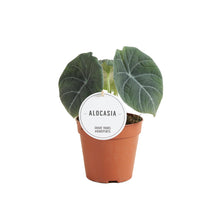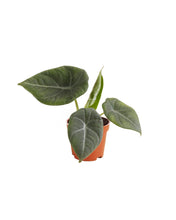Alocasia is part of the Araceae family and native range of this genus is Tropical & Subtropical Asia to E. Australia.
‘Maharani’ is a cross of Alocasia reginula and Alocasia melo, Peter Boyce is the creator of this hybrid. It has thick, coriaceous leaves and compact growth habit. Leaf blades are greyish green with lighter venation.
The hybrid was named after the hindi word for queen, Maharani (महारानी).
Light: Alocasia 'Maharani' thrives in bright, indirect light. Direct sunlight can scorch the leaves, while insufficient light can lead to less intense coloration and leggy growth. A spot near a window with filtered light in a UK home would be suitable.
Water: Keep the soil consistently moist but not waterlogged. Allow the top inch or two of the potting mix to dry slightly between waterings. Ensure good drainage to prevent root rot, which can be a concern in the UK climate.
Soil: A well-draining, airy potting mix is essential. A mix designed for aroids, containing ingredients like perlite, orchid bark, and coco coir, is often recommended to provide the necessary drainage and aeration.
Fertilising: Feed with a diluted, balanced liquid fertilizer every four to six weeks during the growing season (spring and summer). Reduce or stop fertilizing during the autumn and winter months when the plant's growth naturally slows down.
Temperature: Prefers warm temperatures, ideally between 18°C and 27°C (65°F and 80°F). Protect it from cold drafts and sudden temperature changes, which can occur in UK homes, especially during colder months.
Humidity: High humidity is beneficial for Alocasia 'Maharani'. Consider using a humidifier, pebble tray, or placing it in a naturally humid room to maintain optimal conditions, especially during drier periods indoors in the UK.
Growth Habit: This Alocasia has a compact, upright growth habit, with new leaves emerging from a central rhizome. It tends to stay smaller than some other Alocasia varieties.
Toxicity: Like other Alocasias, 'Maharani' is toxic if ingested. Keep it out of reach of pets and small children.



